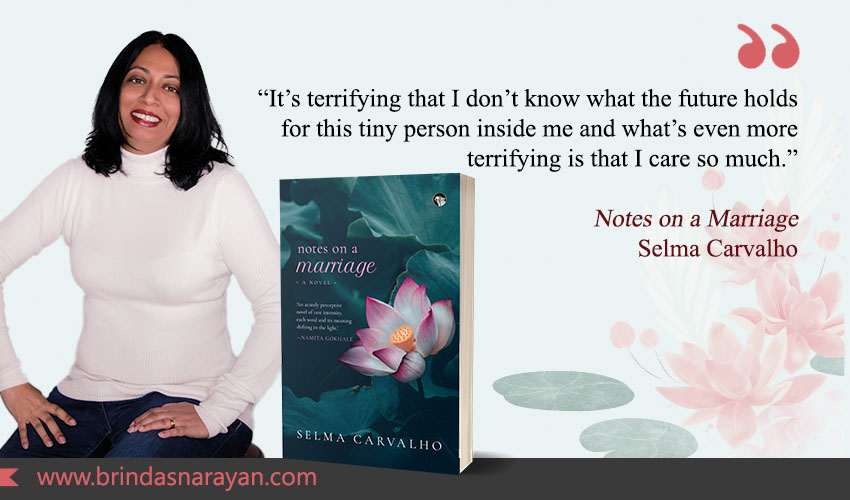
Performing Love: The Inner Workings of a Marriage
In Notes on a Marriage, Carvalho observes that it’s not just weddings, but even marriages that are performative. Anju and Freddo have been married for (gasp!) twenty years, but she still acts out in his presence. Displays, for instance, that she’s a “friendly neighbor”, because after all, “such tiny moments where they reinforce their worth to each other are necessary.” Anju is not even someone who necessarily likes people. She can’t be bothered with sustaining irksome relationships.
Then there are the infidelities. Just before they leave for a weekend in Belgium, Anju uncovers Freddo’s affair with someone. It’s not just been one faithless night, but a string of many, with different women. Still they keep at it. At marriage, that is. They’re meeting friends, after all. Another childless couple, “all laughter, warm hugs, pats on the back, that sort of thing.”
On a flight, an attractive woman seems to eye Freddo with curiosity, maybe yearning. And watch Anju with a question mark and pity. But Freddo, like her, is equally adept at playing his part. He can seem like the loving, committed partner she might want him to be.
After all, Freddo too might be tired with who he has become – a philandering, middle-aged professor. He used to be a charismatic revolutionary at college, called Che Freddo by friends. He even had Che’s symbolic affectations, the Cuban cigars, the camouflage trousers. Anju Kale might have been sucked into his magnetic field because of a desperation to belong.
She’s a hybrid. With a white, Christian, rich British mother. And an Indian father, a Marxist in his student days, a tyrannical patriarch at home. She’s always grown up feeling, “Not this, Not this,” embodying the Neti Neti of our Vedas. Like when she stumbles on a bunch of Asians protesting against something, and doesn’t join them, she’s derided for being a “coconut” – “brown on the outside and white inside.”
The manor where her family lives can be mapped by emotions she associates with each room. The living room, “where bald-faced lies surface.” The bedrooms dredge up “unwanted truths.” It’s only the kitchen that seems to offer homely warmth, some semblance of peace. When her mother and she eat dinner, her father slumps on the floor. They rush him to a hospital. He dies between chapters.
Anju meets Andrew at a second-hand bookshop. He’s attractively bookish, with an intellectual aura about him. When she asks him for a copy of Anais Nin’s short stories, he says the person who dropped it off didn’t seem the type who would read her.
“Is there a type?”
“I think so – smart, elegant, articulate, pretentious and sexually repressed.”
That’s Andrew’s pick-up line, a pointed invitation that Anju responds to. They head to an intimate poetry reading, then back to the bookstore. And “make love on the floor.”
The affair has consequences. Anju gets pregnant. Freddo might suspect the child’s parentage, but if so, he doesn’t express his doubts. And the new situationship seems to halt Freddo’s affairs. Like the change in Anju’s body has mysteriously rubbed off on him. In fact, he’s become so compliant, so lamb-like, it worries Anju. Such power, centered around a precarious, egg-shell creature inside her body, might not last. Should she gloat or should she just gear up for its inevitable withdrawal?
Yet, the marriage lasts. There is something tying them together, a mysterious past centered around a college friend – Eugenia – whose presence keeps intruding into Anju’s thoughts. Whose association with the couple is not sketched out till the second half of this tightly-woven novella. Marriage Story, the 2019 film on Netflix directed by Noah Baumback, depicts a couple in the throes of a long, harrowing divorce, that perhaps leaves them better off at the end. Notes on a Marriage, portrays a related but different tribulation – a couple abiding with what seems like a loveless, faithless partnership, because of a common past, and the twinges of shared guilt.
But perhaps, as Carvalho, seems to imply, that’s enough. Because, love itself, as the author puts it, rests on tedium. An abidance with mundanities that Anju’s father lacked. “To genuinely care about the nuts and bolts of another life. That is a boring task…” With the new baby to look forward to, and with the ennui and routines associated with parenting, perhaps theirs will be a marriage that rediscovers enchantment.
References
Selma Carvalho, Notes on a Marriage, Speaking Tiger Books, 2024




